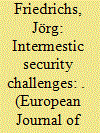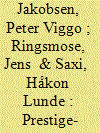|
|
|
Sort Order |
|
|
|
Items / Page
|
|
|
|
|
|
|
| Srl | Item |
| 1 |
ID:
158954


|
|
|
|
|
| Summary/Abstract |
States generate the hardware of military power by either developing new technologies as first mover or adopting demonstrated technology as second mover. Given that military drones have arguably demonstrated effectiveness and thus proliferate, scholars have produced profound insights into today’s second mover dynamics. Yet, the preceding political process of developing this military technology remains poorly understood. The article’s objective is to explain how states become first movers of military hardware. To this end, it applies four causal mechanisms of military innovation studies to the historical trajectory of the development of drones. I argue that security threats initially formed state interests in drones. Yet, capacity was necessary for success. Politically induced transfers and cross-sector diffusion supplied technological progress. At the same time, distributional implications and legacy systems constrained the development process, but could ultimately be overcome. This mechanismic pathway results from the process-tracing analysis of two separate, but related trajectories in Israel and the United States since the 1970s. Given within-case variation, a sequencing and domain-of-application perspective allows the formulation of scope conditions of the mechanisms behind military innovation. This contributes to a historically contingent, yet generalisable, understanding of the political process of how states generate military power.
|
|
|
|
|
|
|
|
|
|
|
|
|
|
|
|
| 2 |
ID:
158953


|
|
|
|
|
| Summary/Abstract |
Intermestic security challenges arise when there is concern in a country that a dissatisfied minority relies on transnational bonds with a foreign kin group for support. They result from ethnic and/or ideological affinities translating into foreign support seen as problematic, and they are aggravated when the dissatisfied minority is able to raise territorial claims. This can lead to complications not only in domestic politics, but also in international relations (hence, the term ‘intermestic’). Intermestic challenges can escalate into civil war and other political calamities, but they can also be managed by governments. This article develops a theoretical model and discusses it with regard to China and its Muslim-majority neighbouring countries. To the west of China, transnational bonds of Uyghur Muslims in Xinjiang with co-ethnics and coreligionists in Central Asia, Pakistan, and Afghanistan complicate Chinese relations with those countries. In the southeast, transnational bonds of ethnic Chinese in Indonesia and Malaysia with their ancestral homeland have complicated Indonesian and Malaysian relations with China. While the cases have followed different trajectories, Beijing has managed either challenge rather successfully. The theoretical model developed and the management strategies discussed are likely to be useful in other contexts.
|
|
|
|
|
|
|
|
|
|
|
|
|
|
|
|
| 3 |
ID:
158957


|
|
|
|
|
| Summary/Abstract |
In this article we broaden the conventional understanding of prestige and show that prestige-seeking played a major role in the Danish and Norwegian decisions to provide military support to post-Cold War US-led wars. Both countries made costly military contributions in the hope of increasing their standing and prestige in Washington. Both governments regarded prestige as a form of soft power, which they could later convert into access, influence, and US support. Our findings are far from trivial. They make a theoretical contribution by demonstrating that small powers understand and seek prestige in ways that differ fundamentally from the ways great powers do. They also help to explain why smaller US allies made costly contributions to the Balkan, Afghan, Iraq, and Libyan wars at a time when there was no direct threat to their national security and their security dependence on the United States was low. The high value that small US allies attach to their visibility and prestige in Washington suggests that it is far easier for the United States to obtain military support from smaller allies than Realist studies of burden-sharing and collective action problems would lead us to expect.
|
|
|
|
|
|
|
|
|
|
|
|
|
|
|
|
| 4 |
ID:
158956


|
|
|
|
|
| Summary/Abstract |
Drawing on insights from International Relations and social movement theories, I explore anti-base protests on Jeju Island and the ensuing politics of peace. I find that the clash between activists and policymakers is fundamentally tied to different views regarding the legitimacy of state actions on security policy and whether actors see states or people as the primary object of security. These real-world differences are mirrored in realist and critical perspectives of international politics. Policymakers tend to view the naval base as a means of protecting national interests and enhancing maritime security. Meanwhile, anti-base activists seek emancipation from an illegitimate state project uprooting a peaceful community. However, the perpetuation of a powerful realist discursive structure within the South Korean security and foreign policy establishment presents significant hurdles for anti-base movements in advancing their cause. My findings are based on ethnographic research in Gangjeong village in July 2012, interviews with activists and policymakers in South Korea, and an analysis of state and activist discourse in both Korean and English language sources.
|
|
|
|
|
|
|
|
|
|
|
|
|
|
|
|
| 5 |
ID:
158952


|
|
|
|
|
| Summary/Abstract |
This article re-examines the history of NATO’s original post-Cold War enlargement to include the Visegrad states of Poland, Hungary, and the Czech Republic. It uses both published materials and the author’s new interviews with key US and Russian policymakers, and employs robust qualitative counterfactual methods to ask two questions: whether there were any realistic alternatives to NATO enlargement, and whether NATO enlargement was responsible for the downturn in Russian relations with the West. It concludes that domestic politics were the dominant factors explaining policy directions on both the US and Russian sides; that NATO enlargement was probably inevitable given US domestic political factors and West European acquiescence; that Russia’s turn against the West preceded the NATO expansion discussion in the US; that the tenor of the Russian turn is explained by status concerns rather than military threat perceptions, and that it was aggravated most by Western unilateral airstrikes rather than NATO’s geographical enlargement; and that the one policy initiative that might have realistically slowed NATO enlargement if it had been adopted differently, Partnership for Peace, did not affect those Russian status concerns and thus could not have redirected the relationship.
|
|
|
|
|
|
|
|
|
|
|
|
|
|
|
|
| 6 |
ID:
158955


|
|
|
|
|
| Summary/Abstract |
Combining the English School of International Relations and the study of grand strategy decision-making processes, this article investigates how dynamic density – growing volume, velocity, and diversity of interactions within international society – alters states’ strategy formation processes. By contrasting the perspectives of structural realism and the English School on the role of dynamic density in world politics, the piece illustrates the strategist’s dilemma: as global dynamic density in the international society increases, the ability of great powers to formulate coherent grand strategies and policies potentially decreases. Specifically, it contends that growing global dynamic density generates processual and substantive fragmentation in strategy formation. Building on a large body of elite interviews, US policy toward China – and the so-called US ‘rebalance’ to Asia – is used as a probability probe of the central idea of the strategist’s dilemma. In conclusion, we contrast our findings with complex interdependence theory and examine their implications for ‘great power management’ (GPM) as a primary institution of international society. We argue that, by generating processual and substantive fragmentation in strategy formation, global dynamic density complicates GPM by hindering the capacity of great powers to manage and calibrate the competitive and cooperative dynamics at play in a bilateral relationship.
|
|
|
|
|
|
|
|
|
|
|
|
|
|
|
|
|
|
|
|
|